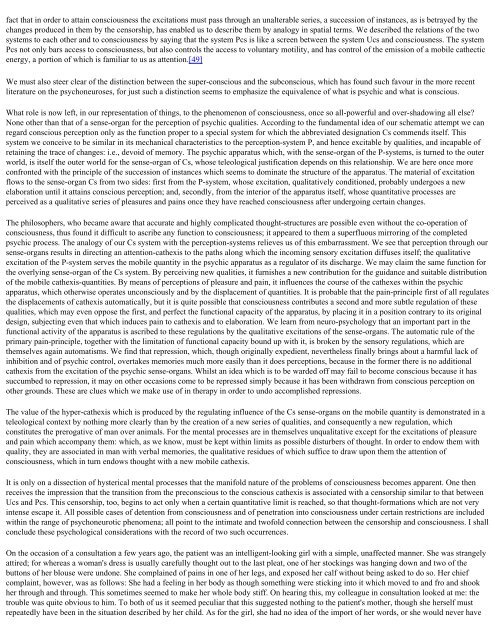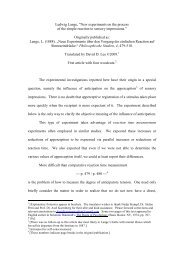The Interpretation Of Dreams Sigmund Freud (1900) PREFACE
The Interpretation Of Dreams Sigmund Freud (1900) PREFACE
The Interpretation Of Dreams Sigmund Freud (1900) PREFACE
Create successful ePaper yourself
Turn your PDF publications into a flip-book with our unique Google optimized e-Paper software.
fact that in order to attain consciousness the excitations must pass through an unalterable series, a succession of instances, as is betrayed by the<br />
changes produced in them by the censorship, has enabled us to describe them by analogy in spatial terms. We described the relations of the two<br />
systems to each other and to consciousness by saying that the system Pcs is like a screen between the system Ucs and consciousness. <strong>The</strong> system<br />
Pcs not only bars access to consciousness, but also controls the access to voluntary motility, and has control of the emission of a mobile cathectic<br />
energy, a portion of which is familiar to us as attention.[49]<br />
We must also steer clear of the distinction between the super-conscious and the subconscious, which has found such favour in the more recent<br />
literature on the psychoneuroses, for just such a distinction seems to emphasize the equivalence of what is psychic and what is conscious.<br />
What role is now left, in our representation of things, to the phenomenon of consciousness, once so all-powerful and over-shadowing all else?<br />
None other than that of a sense-organ for the perception of psychic qualities. According to the fundamental idea of our schematic attempt we can<br />
regard conscious perception only as the function proper to a special system for which the abbreviated designation Cs commends itself. This<br />
system we conceive to be similar in its mechanical characteristics to the perception-system P, and hence excitable by qualities, and incapable of<br />
retaining the trace of changes: i.e., devoid of memory. <strong>The</strong> psychic apparatus which, with the sense-organ of the P-systems, is turned to the outer<br />
world, is itself the outer world for the sense-organ of Cs, whose teleological justification depends on this relationship. We are here once more<br />
confronted with the principle of the succession of instances which seems to dominate the structure of the apparatus. <strong>The</strong> material of excitation<br />
flows to the sense-organ Cs from two sides: first from the P-system, whose excitation, qualitatively conditioned, probably undergoes a new<br />
elaboration until it attains conscious perception; and, secondly, from the interior of the apparatus itself, whose quantitative processes are<br />
perceived as a qualitative series of pleasures and pains once they have reached consciousness after undergoing certain changes.<br />
<strong>The</strong> philosophers, who became aware that accurate and highly complicated thought-structures are possible even without the co-operation of<br />
consciousness, thus found it difficult to ascribe any function to consciousness; it appeared to them a superfluous mirroring of the completed<br />
psychic process. <strong>The</strong> analogy of our Cs system with the perception-systems relieves us of this embarrassment. We see that perception through our<br />
sense-organs results in directing an attention-cathexis to the paths along which the incoming sensory excitation diffuses itself; the qualitative<br />
excitation of the P-system serves the mobile quantity in the psychic apparatus as a regulator of its discharge. We may claim the same function for<br />
the overlying sense-organ of the Cs system. By perceiving new qualities, it furnishes a new contribution for the guidance and suitable distribution<br />
of the mobile cathexis-quantities. By means of perceptions of pleasure and pain, it influences the course of the cathexes within the psychic<br />
apparatus, which otherwise operates unconsciously and by the displacement of quantities. It is probable that the pain-principle first of all regulates<br />
the displacements of cathexis automatically, but it is quite possible that consciousness contributes a second and more subtle regulation of these<br />
qualities, which may even oppose the first, and perfect the functional capacity of the apparatus, by placing it in a position contrary to its original<br />
design, subjecting even that which induces pain to cathexis and to elaboration. We learn from neuro-psychology that an important part in the<br />
functional activity of the apparatus is ascribed to these regulations by the qualitative excitations of the sense-organs. <strong>The</strong> automatic rule of the<br />
primary pain-principle, together with the limitation of functional capacity bound up with it, is broken by the sensory regulations, which are<br />
themselves again automatisms. We find that repression, which, though originally expedient, nevertheless finally brings about a harmful lack of<br />
inhibition and of psychic control, overtakes memories much more easily than it does perceptions, because in the former there is no additional<br />
cathexis from the excitation of the psychic sense-organs. Whilst an idea which is to be warded off may fail to become conscious because it has<br />
succumbed to repression, it may on other occasions come to be repressed simply because it has been withdrawn from conscious perception on<br />
other grounds. <strong>The</strong>se are clues which we make use of in therapy in order to undo accomplished repressions.<br />
<strong>The</strong> value of the hyper-cathexis which is produced by the regulating influence of the Cs sense-organs on the mobile quantity is demonstrated in a<br />
teleological context by nothing more clearly than by the creation of a new series of qualities, and consequently a new regulation, which<br />
constitutes the prerogative of man over animals. For the mental processes are in themselves unqualitative except for the excitations of pleasure<br />
and pain which accompany them: which, as we know, must be kept within limits as possible disturbers of thought. In order to endow them with<br />
quality, they are associated in man with verbal memories, the qualitative residues of which suffice to draw upon them the attention of<br />
consciousness, which in turn endows thought with a new mobile cathexis.<br />
It is only on a dissection of hysterical mental processes that the manifold nature of the problems of consciousness becomes apparent. One then<br />
receives the impression that the transition from the preconscious to the conscious cathexis is associated with a censorship similar to that between<br />
Ucs and Pcs. This censorship, too, begins to act only when a certain quantitative limit is reached, so that thought-formations which are not very<br />
intense escape it. All possible cases of detention from consciousness and of penetration into consciousness under certain restrictions are included<br />
within the range of psychoneurotic phenomena; all point to the intimate and twofold connection between the censorship and consciousness. I shall<br />
conclude these psychological considerations with the record of two such occurrences.<br />
On the occasion of a consultation a few years ago, the patient was an intelligent-looking girl with a simple, unaffected manner. She was strangely<br />
attired; for whereas a woman's dress is usually carefully thought out to the last pleat, one of her stockings was hanging down and two of the<br />
buttons of her blouse were undone. She complained of pains in one of her legs, and exposed her calf without being asked to do so. Her chief<br />
complaint, however, was as follows: She had a feeling in her body as though something were sticking into it which moved to and fro and shook<br />
her through and through. This sometimes seemed to make her whole body stiff. On hearing this, my colleague in consultation looked at me: the<br />
trouble was quite obvious to him. To both of us it seemed peculiar that this suggested nothing to the patient's mother, though she herself must<br />
repeatedly have been in the situation described by her child. As for the girl, she had no idea of the import of her words, or she would never have



